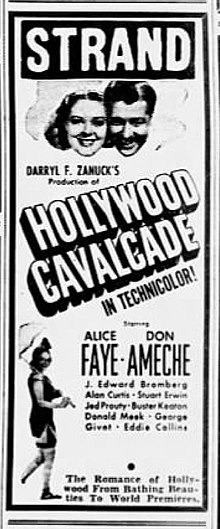fiction.wikisort.org - Movie
Hollywood Cavalcade is a 1939 American film featuring Alice Faye as a young performer making her way in the early days of Hollywood, from slapstick silent pictures through the transition from silent to sound.
This article needs additional citations for verification. (June 2019) |
| Hollywood Cavalcade | |
|---|---|
 Newspaper advertisement | |
| Directed by | Irving Cummings |
| Screenplay by | Ernest Pascal |
| Story by | Hilary Lynn Brown Holmes |
| Produced by | Darryl F. Zanuck |
| Starring | Alice Faye Don Ameche J. Edward Bromberg Alan Curtis |
| Cinematography | Allen M. Davey Ernest Palmer |
| Edited by | Walter Thompson |
| Music by | Cyril J. Mockridge |
Production company | 20th Century Fox |
| Distributed by | 20th Century Fox |
Release date |
|
Running time | 97 minutes |
| Country | United States |
| Language | English |
Production
In the wake of Alice Faye's 1938 success Alexander's Ragtime Band, which took a nostalgic look at the musical scene of the 1910s, screenwriter Lou Breslow approached studio chief Darryl F. Zanuck with an idea to do another period piece, this time in Technicolor, concerning the early days of silent movies.[1] The film was directed by Irving Cummings, with comedy sequences directed by Mal St. Clair. St. Clair's old crony Buster Keaton staged some of the gags, and a host of silent-era comedians re-created slapstick sight gags. The romance in the storyline was based on the real-life relationship between pioneer producer Mack Sennett and his first star, Mabel Normand.
Atypical for Faye's 20th Century-Fox output, Hollywood Cavalcade has no musical numbers, and the tone is more dramatic than comic. (The working title was Falling Stars.) The film presents a fictionalized look at silent-era performers and their productions, and ends just after the silent-film industry converts to sound films.
Plot
In 1913, movie director Michael Linnett Connors (Don Ameche), chooses Broadway ingenue Molly Adair (Alice Faye) to be in his next film. He makes her a major star in slapstick comedies. Although she is in love with him, she can't understand his preoccupation with the picture business, and wrongly thinks that Connors regards her only in terms of movies. When she marries her co-star Nicky Hayden (Alan Curtis), Connors misunderstands her and fires her. The disillusioned director's career quickly declines, but his ice-cold demeanor changes when he sees the first talking feature film. Inspired, he approaches Molly and eagerly plans her first sound film.
Cast
- Alice Faye as Molly Adair Hayden
- Don Ameche as Mike Connors
- J. Edward Bromberg as Dave Spingold
- Alan Curtis as Nicky Hayden
- Stuart Erwin as Pete Tinney, Mike's cameraman
- Jed Prouty as Keystone Cop Police Chief
- Buster Keaton as himself
- Donald Meek as Lyle P. Stout, producer
- George Givot as Claude, Molly's suitor opposite Keaton
- Al Jolson as himself
- Eddie Collins as Keystone Cop
- Russell Hicks as Roberts, film executive
- Hank Mann as Keystone Cop
- Heinie Conklin as Keystone Cop
- James Finlayson as Keystone Cop
- Chick Chandler as Chick, Mike's assistant director
- Snub Pollard as Keystone Cop
- Robert Lowery as Henry Potter
- Ben Welden as Agent
- Willie Fung as Willie
- Paul Stanton as Filson
- Mary Forbes as Mrs. Gaynes
- Joseph Crehan as Attorney
- Irving Bacon as Clerk
- Ben Turpin as Bartender in Western
- Chester Conklin as Sheriff in Western
- Marjorie Beebe as Telephone Operator
- Frederick Burton as Thomas
- Lee Duncan as Lee Duncan, the Dog Trainer
- Rin Tin Tin Jr. as Rin-Tin-Tin
- Mack Sennett as himself
References
- Scott MacGillivray, Laurel & Hardy: From the Forties Forward, Second Edition, iUniverse, 2009, p. 13. ISBN 978-1440172373.
External links
- Hollywood Cavalcade at IMDb
- Synopsis at AllMovie
- Turner Classic Movies page
На других языках
[de] Damals in Hollywood
Damals in Hollywood ist eine US-amerikanische Filmkomödie aus dem Jahr 1939 mit zahlreichen Gastauftritten von Stars aus der Stummfilmzeit. Der Film wurde von 20th Century Fox produziert und lehnt sich an das Leben des Stummfilmproduzenten Mack Sennett und dessen erstem Star Mabel Normand an.- [en] Hollywood Cavalcade
[ru] Голливудская кавалькада
Голливудская кавалькада (англ. Hollywood Cavalcade) — американская кинокомедия 1939 года режиссёра Ирвинга Каммингса.Другой контент может иметь иную лицензию. Перед использованием материалов сайта WikiSort.org внимательно изучите правила лицензирования конкретных элементов наполнения сайта.
WikiSort.org - проект по пересортировке и дополнению контента Википедии